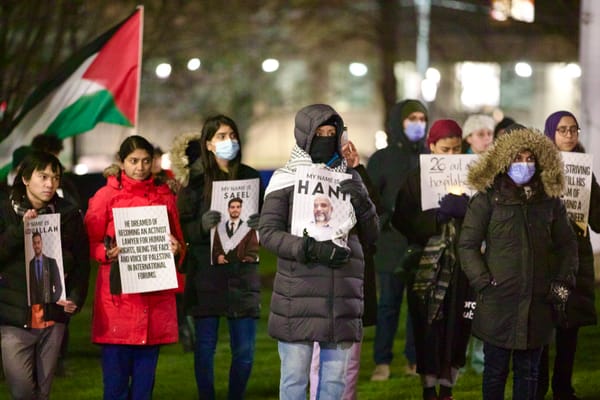Last week, the Federal Minister of Diversity and Inclusion and Youth, Bardish Chagger, issued a statement for Pride month: “This year, as we commemorate the 50th anniversary of the ‘We Demand’ Rally, the first large-scale protests for LGBTQ2 rights in Canada, we are reminded that Pride Season goes beyond parades and summer festivals. […] Pride Season provides safer spaces for sexually and gender diverse people in Canada where they can be their most true, authentic selves.”
Chagger calls on Canadians to update “your personal and your organizations’ cover images on all your social media platforms,” in order to “make a colourful splash online as we create a more equitable society.”
While it’s a nice sentiment and all, Chagger completely omits details on what the government is doing to help queer, trans and Two Spirit communities thrive. Sure, the Commons finally passed legislation to criminalize conversion therapy despite Conservative opposition — but Liberals promised that in 2019, and the current iteration took eight months to go from first reading to third vote.
Many of the challenges we face are due to bad policy, which means they can be fixed by better policy. So, this Pride season, why not demand our elected representatives go beyond photo ops and supportive tweets, and do something useful?
Here’s a list of six ways the government can start to make Canada the “more equitable society” they apparently want.
Repeal The Blood Ban
In his 2015 campaign for prime minister, Justin Trudeau promised to completely repeal the ban on men who have had sex with men in the past five years donating blood. It would be replaced with a gender-neutral questionnaire, screening for high-risk behaviours rather than sexuality. Though there’s multiple stakeholders at play here (Health Canada, Canadian Blood Services and Hema-Quebec), the practice is ultimately governed by federal legislation.
Since becoming prime minister, Trudeau has reduced the required period of abstinence twice: in 2016 to one year, and in 2019 to three months. Since then, however, progress toward completely repealing the ban has stalled.
This provision, which also affects some trans people, is discriminatory, as it doesn’t matter if you have a long-term monogamous partner and only practice safer sex: you’re still temporarily banned from giving blood. There’s currently a human rights inquiry in progress to determine if the policy legally counts as discrimination, which, unsurprisingly, the federal government tried to block.
Repealing the blood ban is the easiest policy on this list. Why are we still waiting for it?
Fund Trans Healthcare (All Of It)
Healthcare policy is decided federally, but supplied provincially. Money is a factor in accessing health care for everyone, but it affects queer, and especially trans, people partricularly acutely. Paying for treatment is a struggle — and that’s if you can access care in the first place.
We’re more likely to have mental health problems than straight, cis people — and less likely to be able to afford therapy. People who medically transition have to pay for hormones, most often out of pocket. All provinces and territories currently fund some trans-affirming surgeries, but other procedures — like voice coaching, chest contouring, facial surgeries or electrolysis — aren’t publicly funded, except in Yukon. Obviously, not all trans people choose to transition medically, but everyone who does deserves a better system than the one we currently have.
The federal government could add all transition-related procedures to the list of healthcare items it currently funds. While it’s up to provincial and territorial governments to decide what they consider “medically necessary for health insurance purposes,” some procedures, such as abortion access, are mandated, and provinces and territories who don’t provide sufficient access to them are financially penalized. All transition-related procedures should be categorized this way, and Yukon provides a great blueprint of what to cover.
Currently, the funding model creates a narrative where having an operation is the single most important part of being trans, as that’s apparently the only thing universally considered “medically necessary.” But every transition is different; what counts as “medically necessary” varies from person to person. There are trans women who prioritize tracheal shaves or facial feminization surgeries over bottom surgery, for instance, but their healthcare needs aren’t treated seriously.
Funding more procedures allows trans people to advocate for their own transition needs.
Pass Universal Pharmacare
The long-promised universal pharmacare would also benefit trans people who use hormones. Paying for medications out of pocket sucks when you’re on them for the rest of your life. Hormone effectiveness varies widely from person to person, so figuring out the dose, combination of medicines or ingestion method that works best for you would be much easier if those costs were entirely covered — or at least standardized to a more affordable price.
It would also make it so much easier for poor trans and non-binary people to be able to start transitioning, as cost is frequently cited as a barrier to beginning the medical process. (There are other barriers too, like a lack of knowledgeable healthcare providers, but that’s harder for the feds to legislate.)
Mandate LGBTQ2S+ Inclusive Sex Ed
A 2019 report from Action Canada, a sexual health and rights advocacy group, outlines the need for federal government oversight in sex-ed. The feds currently aren’t collecting information on the quality of sex-ed, the report states, which if done would allow them to effectively “develop and monitor sex-ed curricula and delivery.”
The current system passes on the responsibility for sex-ed to provinces, some of which, including Alberta and Ontario, allow parents to opt their kids out of it.
Not telling kids about LGBTQ2S+ topics — or labelling them sensitive issues that kids can just duck out of — reinforces the idea that queer people don’t exist. There’s a reason transphobes are drawn to bogus “social contagion” theories that hanging out with trans people can suddenly make kids trans: you can’t be what you don’t know exists.
Telling kids in schools about queer and trans people, normalizing our presence and giving educators clear instructions rather than vague ideas on how to handle these topics would help ensure they’re actually taught and prioritized.
We shouldn’t need to rely on well-meaning resource lists or TikTok sex educators. Kids should be able to access this information in schools, free from judgement or discrimination.
Anything the federal government can do to standardize sex-ed will help improve the situation for young people — and hopefully give cis, straight kids more empathy when they inevitably end up in positions of power a few decades down the line.
Make Name Changes Free
Queer and trans people are more likely to change their first names than straight, cis people. The process of changing your name in Canada is also needlessly expensive — $165 in Nova Scotia, $144 in Quebec, $137 in British Columbia and Ontario, $120 in Manitoba and Alberta, and $50 in Yukon, for instance. And that’s before you do the paperwork, and pay the additional costs, for your passport, driver’s license and everything else with your name on it. In some provinces, your name change is published online, so part of the cost is paying to be deadnamed in your provincial Gazette.
With so many associated costs to changing your name, why not make the change itself free?
In the United Kingdom, you can change your name by signing a deed poll — a piece of paper with your former name and your new name — witnessed by just one person that knows you. The poll doesn’t even need to be notarized to be a legally binding document. You can have the new name included in the public record for £42.44 (about $70) but it’s not necessary.
In Canada, provinces are tasked with devising rules around name changes. While implementation can stay provincially managed, the federal government could outlaw charging for the privilege. If that’s absolutely impossible due to the time involved in changing records, then we could set a federal maximum cost for the “processing fees” — say, $20, and agree to cover any deficit. There’s no reason the same bureaucratic task should cost three times as much in Nova Scotia as it does in Yukon.
Actually Expunge LGBTQ2S+ Criminal Records
In 2017, when Trudau apologized to “individuals harmed by federal legislation, policies and practices that led to the oppression of and discrimination against [LGBTQ2S+] people in Canada, he also introduced Bill C-66, the Expungement of Historically Unjust Conviction Act. This legislation allowed people who had been convicted of criminalized queer behaviour to petition to have their records cleared. The apology itself was a bit milquetoast, but many hoped it would signal the start of better policies.
Not only has the federal government done little to improve LGBTQ2S+ lives since then, but they haven’t even expunged many records: out of about 6,000 Canadians with these historical convictions, there’ve been only 41 applications for expungements, just nine of them successful.
The current expungement legislation requires a huge amount of documentation, plus spending money to acquire historic legal records that may be hard to access. Some crimes, like “bawdy house” offences, which Trudeau mentioned in his apology, or “vagrancy” — both anti-sex work laws that were used to criminalize queer and trans people — are not expungeable.
The government should expand the list of expungeable offences, drop the expensive and convoluted documentation requirements and actively provide help to navigate the system. The people criminalized by these bogus offenses are largely our queer elders. Without them, we wouldn’t even have Pride.
We can celebrate victories in the last 50 years while still pushing our politicians to recognize national shortcomings. After all, Pride is a protest. If we’re not demanding our rights from the government, we’re missing the whole point of the month.







